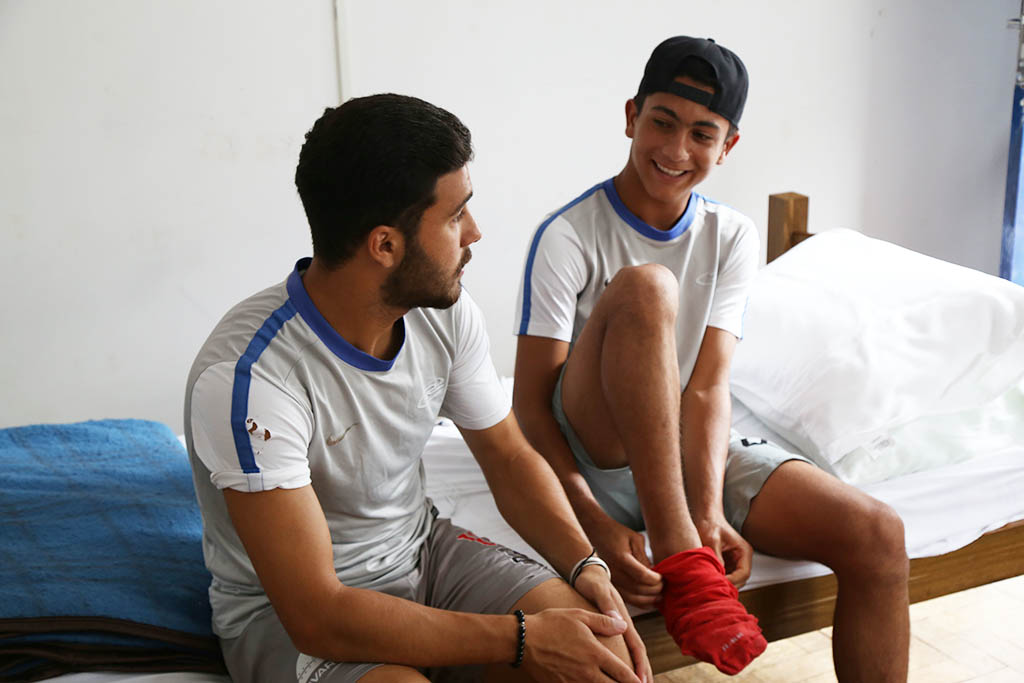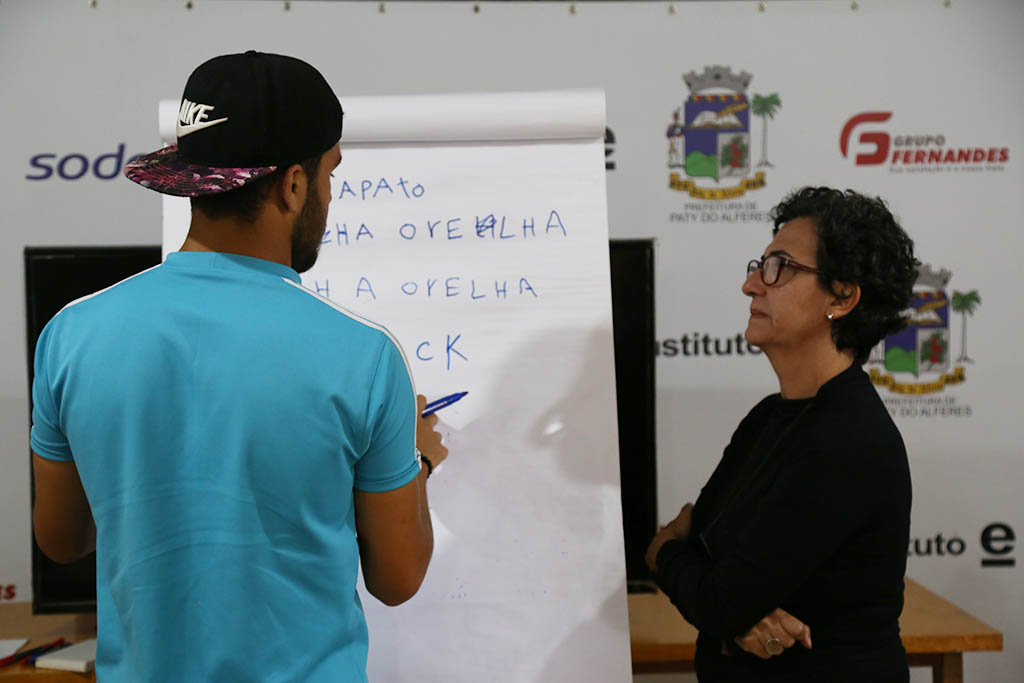Zaatari refugee camp in Jordan and the municipality of Paty do Alferes in the southern state of Rio de Janeiro are linked by a special element: Pérolas Negras, the city’s football club.
© UNIC/Ana Rosa Alves

Two of the young refugee soccer players prepare themselves to perform a training session at Perolas Negras Soccer Academy. © UNIC/Ana Rosa Alves
Rio de Janeiro, Brazil, May 15th 2019 (UNHCR) – Zaatari refugee camp in Jordan and the municipality of Paty do Alferes in the southern state of Rio de Janeiro are linked by a special element: Pérolas Negras, the city’s football club.
In 2018, the technical staff of Pérolas Negras team went to Zaatari to select a few football athletes who stood out to join the team in Brazil. Among the 150 young boys who appeared for the initial selective, five were selected: Ahmad, Hafith, Jawdat, Omar and Quais.
“The Syrians were chosen in a very hard process that took about one month. There were several training sessions and matches to identify talents that could effectively come to Brazil to train with our team and seek a place in the football market”, said Paula Mello, education coordinator at Pérolas Negras.
With around 78,500 inhabitants, wherever you look in Zaatari refugee camp there are people of all ages playing football. Between the caravans, on the dusty outskirts of the camp and on the many football pitches that have been built in the camp after it was established in 2012 in response to the conflict in Syria which began the year before.
Defender Quais, 14, who had lived in the camp for about half of his life was one of the players who showed the most potential. As a child, he played football in the Syrian streets, but it was in Jordan that he started thinking about becoming a professional athlete.
“In Zaatari I was part of a team and the coach told us that there would be a selection to play professionally in Brazil. I signed up and I ended up being chosen. It’s wonderful to be able to play football”, said the teenager, fan of Brazilian defender Thiago Silva.
Originally from Homs in Western Syria, Ahmad, now 17, had to put his dreams of playing football professionally on hold when he fled to Jordan with his family just before his 10th birthday.
“Before the war, a local team in Syria selected 10 boys each year to train in Qatar. I was one of them, but I could not make it because it was when the war started”, said the midfielder, a fan of Brazilian player, Neymar.
After landing in Brazil last year, the young men, Ahmad, Hafith, Omar and Quais who are players and Jawdat who is a coach, are quickly adapting to life in the country.
“I’m doing really well. My only difficulty, really, is with the language, but I know that I will overcome this obstacle and that it will be fine”, says Hafith, 17.

As a fundamental part of their integration in the team and the community, Portuguese lessons are provided for the entirely team. © UNIC/Ana Rosa Alves
From Daara in Southern Syria, a town about 13 kilometers from the border with Jordan, Hafith’s friends and family have called him Marcelo, a tribute to his Brazilian idol since he was a young age. Back in Zaatari, although his family and friends miss him a lot, they are all proud that Hafith is now pursuing his dreams to follow in Marcelo’s footsteps.
“I hope he will become a star, like Ronaldo, Ronaldino, Marcelo, Kaka. I know he has the potential,” says his father, himself a football coach in his spare time who has trained Hafith since he was a young boy.
With 5.6 million people displaced by the conflict in Syria, most have taken up home in neighboring countries like Turkey, Lebanon and Jordan. But after eight years of war many dream of restarting their lives somewhere new. With resettlement opportunities falling across the world, however, complementary pathways such as this program, are becoming ever more important as a durable solution for refugees.
In Brazil, data from the National Committee for Refugees (CONARE) show that 541 Syrians were recognized as refugees in Brazil in 2018. The number corresponds to 50% of all recognitions. In the same year, another 409 Syrians applied for recognition of their refugee status.
The Pérolas Negras Soccer Academy and their integration
Founded in Haiti by the NGO Viva Rio, the Pérolas Negras Soccer Academy is part of a series of social initiatives for the integration of youth. Initially set up to develop the talent of young Haitian players who had limited opportunities to become professionals in their local football, the club established a training center in the south of Rio de Janeiro, where the most skilled players could come and train to be professional footballers in the Brazilian market and continue their formal education at the same time.
Today, about 60 Brazilian athletes, Syrians and a Venezuelan have ties to the Pérolas Negras. But it is not just about football, with formal education and language classes also an important part of the program. Far from home, however, the transition from Syria to Jordan to Brazil has not always been easy for the young men, but it is through figures like Iolanda Batista, the cook at the Pérolas Negras academy, that Ahmad, Hafith, Jawdat, Omar and Quais have settled into life in Brazil.
“I have two children who live far away and they tell me that the people where they live now have adopted them and I want to do the same because these boys are far from their families. They take photos of me, send them to their mothers, who thank me and ask me to help take care of them”. Despite the balanced diet athletes are required to follow, Iolanda has learned to cook typical dishes from Haiti and Syria to reduce the homesickness of the boys.
Despite the challenges, for Omar, 16, playing football in Brazil is a dream come true.
“It is the dream of any football player to come to Brazil. It is the country that exports the most players. Leaving the family is difficult, but any player who wants to become professional and have a projection will have to go through that”, said striker Omar.
Share on Facebook Share on Twitter